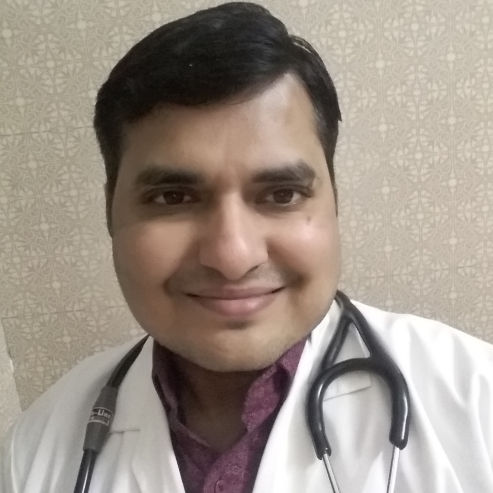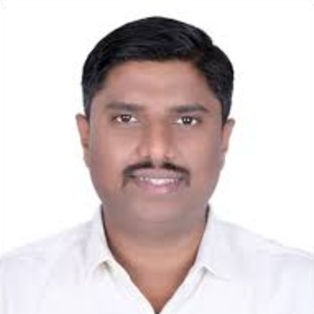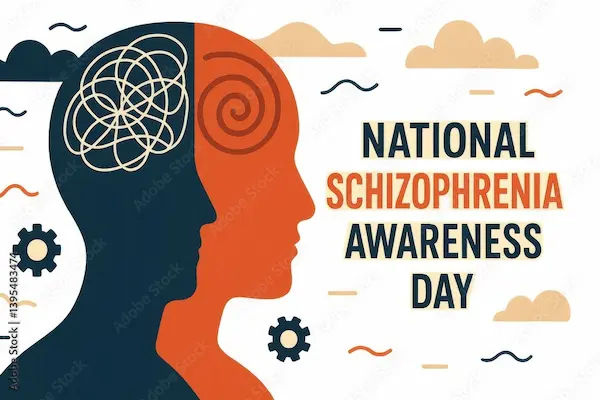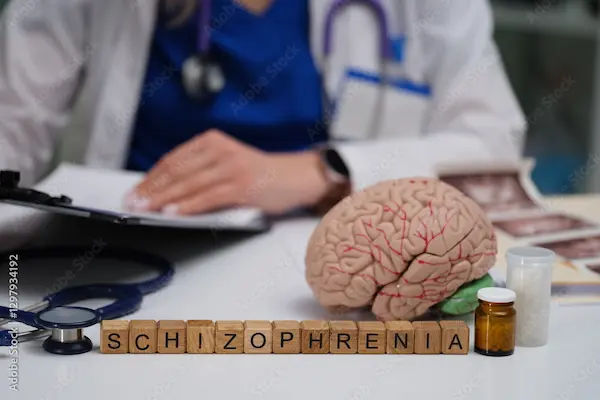Schizophrenia: Symptoms, Causes, Treatment and Types
Know about schizophrenia, a complex mental health disorder affecting thoughts, emotions, and behavior. Learn about its symptoms, causes, different types, and available treatment options for effective management.

Written by Dr. Md Yusuf Shareef
Reviewed by Dr. Shaik Abdul Kalam MD (Physician)
Last updated on 13th Jan, 2026

Introduction
Schizophrenia is a complex mental health condition that affects how a person thinks, feels, and behaves. It can be challenging for both the person experiencing it and their loved ones. However, with the right treatment and support, many people with schizophrenia can lead fulfilling lives.
In this article, we’ll break down what schizophrenia is, its symptoms, causes, types, and available treatments in simple terms.
What is Schizophrenia?
Schizophrenia is a chronic brain disorder that affects about 1 in 300 people worldwide. It often develops in late adolescence or early adulthood and can cause:
- Distorted thinking (difficulty organizing thoughts)
- Hallucinations (seeing or hearing things that aren’t there)
- Delusions (strong false beliefs)
- Trouble with emotions and social interactions
While schizophrenia can be severe, many people manage their symptoms effectively with treatment and support.
Consult a Psychiatrist for the best advice
Symptoms of Schizophrenia
Schizophrenia symptoms are generally divided into three categories:
1. Positive Symptoms (Added Experiences)
These are behaviors not seen in healthy individuals:
- Hallucinations – Hearing voices, seeing things, or sensing things that aren’t real.
- Delusions – Strong false beliefs (e.g., thinking someone is controlling their mind).
- Disorganized speech – Jumping between unrelated topics or speaking in a way that’s hard to follow.
- Abnormal movements – Agitated body movements or catatonia (lack of movement).
2. Negative Symptoms (Reduced Abilities)
These involve a loss of normal functions:
- Lack of motivation – Difficulty starting or completing tasks.
- Reduced emotional expression – Flat tone of voice, lack of facial expressions.
- Social withdrawal – Avoiding friends, family, and social activities.
- Difficulty speaking – Brief, empty replies in conversations.
3. Cognitive Symptoms (Thinking Problems)
- Poor concentration – Trouble focusing or remembering things.
- Difficulty making decisions – Struggling with planning or problem-solving.
Symptoms vary from person to person, and not everyone will experience all of them.
What Causes Schizophrenia?
The exact cause of schizophrenia is unknown, but research suggests a combination of factors:
1. Genetics
- Having a family history of schizophrenia increases risk.
- However, not everyone with a genetic risk develops the condition.
2. Brain Chemistry & Structure
- Imbalances in brain chemicals like dopamine and glutamate may play a role.
- Changes in brain structure (e.g., shrinking of gray matter) have been observed.
3. Environmental Factors
- Pregnancy/birth complications (e.g., infections, malnutrition, or oxygen deprivation at birth).
- Childhood trauma (abuse, neglect, or extreme stress).
- Drug use (especially cannabis, LSD, or amphetamines in adolescence).
Types of Schizophrenia
Previously, schizophrenia was categorized into subtypes, but now doctors focus on symptoms rather than types. However, some common patterns include:
- Paranoid Schizophrenia – Dominated by delusions and hallucinations, often with fear of persecution.
- Disorganized Schizophrenia – Disorganized speech, behavior, and emotional difficulties.
- Catatonic Schizophrenia – Extreme motor disturbances (either excessive movement or no movement at all).
- Residual Schizophrenia – Mild symptoms after a major episode.
- Undifferentiated Schizophrenia – Symptoms don’t fit clearly into one subtype.
Treatment for Schizophrenia
While there’s no cure, schizophrenia can be managed effectively with:
1. Medications (Antipsychotics)
- First-generation (typical) antipsychotics – Haloperidol, Chlorpromazine.
- Second-generation (atypical) antipsychotics – Risperidone, Olanzapine, Aripiprazole.
- These help reduce hallucinations, delusions, and disordered thinking.
2. Psychotherapy (Talk Therapy)
- Cognitive Behavioral Therapy (CBT) – Helps manage distorted thoughts.
- Family therapy – Educates families on how to support their loved ones.
- Social skills training – Improves communication and daily functioning.
3. Rehabilitation & Support Programs
Job training, housing assistance, and community support help individuals live independently.
4. Lifestyle Changes
- Regular exercise – Improves mood and brain function.
- Healthy diet – Omega-3 fatty acids, vitamins, and antioxidants support brain health.
- Avoiding drugs/alcohol – Substance use can worsen symptoms.
- Stress management – Meditation, yoga, and relaxation techniques help.
When to Seek Help?
If you or a loved one experience:
- Hearing voices others don’t hear.
- Strong, irrational beliefs.
- Sudden withdrawal from social life.
- Difficulty thinking clearly.
Consult a mental health professional immediately. Early treatment leads to better outcomes.
Final Thoughts
Schizophrenia is a serious but treatable condition. With medication, therapy, and strong support, many people with schizophrenia lead productive and happy lives. If you or someone you know is struggling, reach out for help; you’re not alone.
Consult a Psychiatrist for the best advice
Consult a Psychiatrist for the best advice

Dr. Kommoju Venkata Eswar
Psychiatrist
8 Years • MBBS, MD Psychiatry
Avenue
Wellness Point, Avenue

Dr. Vivek Pathak
Psychiatrist
15 Years • MBBS, MD (Psychiatry)
Noida
𝗗𝗿 𝗞𝗨𝗠𝗔𝗥'𝗦 𝗙𝗔𝗠𝗜𝗟𝗬 𝗖𝗟𝗜𝗡𝗜𝗖 𝗮𝗻𝗱 𝗩𝗔𝗖𝗖𝗜𝗡𝗔𝗧𝗜𝗢𝗡, Noida
(25+ Patients)

Dr Rohit Ranjan
Psychiatrist
10 Years • MBBS, MD (Psychiatry)
Bengaluru
Apollo Medical Center, Marathahalli, Bengaluru
(25+ Patients)

Dr. Kamal Kishore Verma
Psychiatrist
15 Years • MBBS, MD (SPM), DNB (Psychiatry)
Mathura
PEACEFUL MIND CLINIC, Mathura
(50+ Patients)

Dr Harish K S
Psychiatrist
6 Years • MBBS, MD Pychaitrist
Bengaluru
Apollo Clinic, JP nagar, Bengaluru
Consult a Psychiatrist for the best advice

Dr. Kommoju Venkata Eswar
Psychiatrist
8 Years • MBBS, MD Psychiatry
Avenue
Wellness Point, Avenue

Dr. Vivek Pathak
Psychiatrist
15 Years • MBBS, MD (Psychiatry)
Noida
𝗗𝗿 𝗞𝗨𝗠𝗔𝗥'𝗦 𝗙𝗔𝗠𝗜𝗟𝗬 𝗖𝗟𝗜𝗡𝗜𝗖 𝗮𝗻𝗱 𝗩𝗔𝗖𝗖𝗜𝗡𝗔𝗧𝗜𝗢𝗡, Noida
(25+ Patients)

Dr Rohit Ranjan
Psychiatrist
10 Years • MBBS, MD (Psychiatry)
Bengaluru
Apollo Medical Center, Marathahalli, Bengaluru
(25+ Patients)

Dr. Kamal Kishore Verma
Psychiatrist
15 Years • MBBS, MD (SPM), DNB (Psychiatry)
Mathura
PEACEFUL MIND CLINIC, Mathura
(50+ Patients)

Dr Harish K S
Psychiatrist
6 Years • MBBS, MD Pychaitrist
Bengaluru
Apollo Clinic, JP nagar, Bengaluru


